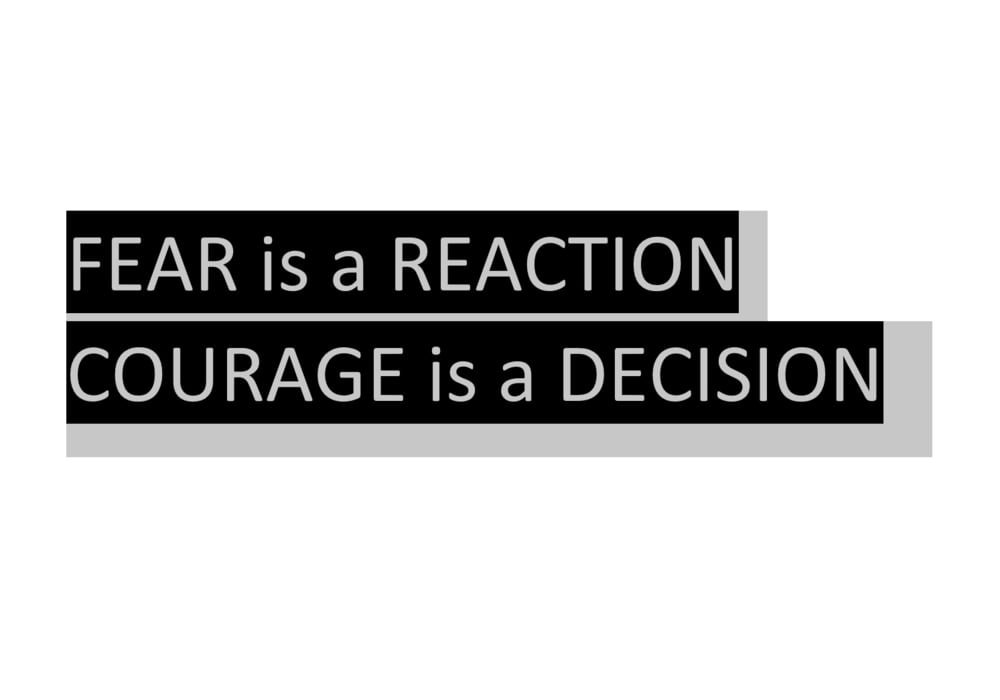How To Fight Fear
Is fear preventing you from moving forward? Is there something that terrifies you? It is common for threats in everyday life, such as being ridiculous in public, facing a disgusting insect, or endangering our health, to horrify us. Yet overcoming fear is possible. Whatever situations you are worried about, in this article how to fight fear, you will find strategies to deal with them. Find out what is causing this emotion and what keeps us from overcoming it. In addition, we give you twenty tips for overcoming fear.
What is fear?
What is fear for? Fear is a basic emotion that warns us of impending risk. It invades us so that the dangers around us do not go unnoticed. Have you ever been paralyzed in the face of a terrifying situation? Have you ever felt so much panic that you ran away before thinking about the consequences? It is only natural to react like this, it is usual responses to this emotional state.
You have to differentiate fear from symptoms of anxiety. The first concept arises when we face a concrete and present event, like a stranger who seems to follow us down a dark alley. On the other hand, anxiety is a more vague and non-specific emotion that arises when we think about less limited circumstances. An example of anxiety is the anxiety that assails us thinking about our uncertain future or that people will criticize us for an action we have taken.
Fear is an adaptive response to danger, whether physical or psychological. However, it does not always happen when faced with a real situation. Sometimes causes like cognitive bias are responsible. The level of fear intensity can range from absolute lack of alarm to absolute panic. The point is, this emotion can turn into a real nightmare.
When does fear turn into a phobia?
When a fear of a specific stimulation becomes grossly disproportionate, it turns into a phobia. Phobia is a psychological disorder whereas fear is a habitual and healthy emotion.
There are different types of phobias: vertigo, phobia of clowns, spiders, etc … Although the trigger for the reaction changes, all phobias cause discomfort in people who suffer from it, sometimes going as far as to seriously interfere with their daily lives. Can you imagine being so scared to go out on the streets that you felt compelled to live locked up in your own home?
It is not necessary to have a phobia for a fear to make us feel unwell. These psychological disorders can make even the most usual tasks of our daily life more difficult. In this article, we give you tips that will help you overcome your fears regardless of their intensity and purpose.
Why are we afraid?
Fear is an emotion that we all feel, and which accompanies us in all phases of our life. It forces us to react quickly and protect ourselves from danger. Feeling a high physiological activation, which prompts us to struggle or flee in a situation that is deemed dangerous is completely adaptive. It pushes us to survive.
There are two main theories that explain how we acquire our fears. The first is that of classical conditioning, which asserts that if we associate elements (snakes, high places, etc.) with detrimental events (injuries, falls, etc.), we establish an association between the two and acquire a response of conditioned fear.
On the other hand, according to Bandura’s social learning theory, we also learn through so-called “vicar” apprenticeship. This means that we learn by observing different models (parents, neighbors, actors, etc.) by internalizing their behavior and by imitating it. If one day we witness how a wasp stings our brother or our friend and we observe his expression of pain and panic, it is likely that every time we see this damn insect we run away at full speed. According to this theory, we are active when choosing whether to imitate a behavior or we, although it is not always that simple.
Fear also gives us positive feelings. It makes us pulse, feel the tension, immobilize us in our chair at the movies or in a horror movie or when we climb into an attraction. In fact, we even seek to experience these sensations when we are sure to keep ourselves safe.
It is necessary that we learn to manage this emotion from our childhood. Even so, one can start to fear some stimulation at any age. On the other hand, some people are more apt to experience this emotion than others. Our past experiences are fundamental when it comes to understanding how we react to reality. Regardless of our personal situation, it is important to know that it is never too late to conquer fear.
How To Fight Fear? 20 tips to overcome fear
In this chapter, we are going to give you twenty recommendations that you can easily carry out on a daily basis and that will help you overcome fear. The most important thing is that you are aware that the fear is inside of you, nothing and no one can make us feel it. Perhaps to think this is difficult enough in the face of heavy scrutiny, but we are responsible for our own personal growth. With a little planning and willpower, overcoming fear is very possible. Here are 20 tips how to fight fear:
1. Don’t try to eradicate all your fears
As we have seen previously, fear is a gift of nature which favors our survival. We can also observe it in animals when they face danger, fortunately our bodies alert us when a threat presents itself. Can you imagine if you weren’t alarmed when you saw a tiger in your living room? Learn to live with this essential emotion. As long as she doesn’t play bad tricks on us, we have to accept our fears.
2. Do you know yourself
Self-assessment increases our well-being. It allows us to understand basic aspects of how we feel or how we want to be in order to act on it. It is not necessary to obsessively explore the roots of our fear of snakes, but identifying the stimuli that cause us unpleasant reactions helps to establish effective strategies for dealing with them when they arise.
3. Acknowledge your fears
You are human. Acting as if your fears don’t exist is counterproductive. You will not be less strong or less appreciated for feeling fear. It doesn’t matter if the object of your fear is unusual or you find it shameful, it is certainly understandable and there are ways to deal with it. Our fears do not disappear as long as we ignore them. Accepting it is the first step in fighting and overcoming fear.
4. Streamline your fears
The fear of fire is quite understandable if we are in a fire. Yet if every time we light the fireplace or the grill we think the house is going to burn down, we will be acting in an illogical way. Thinking about the possibilities for events to happen and acting in a coherent way will allow you to distance yourself from unpleasant cognitive processes.
5. Observe how other people face their fears
Fifth tips on how to fight fear is to oserve hos other people dealing with their fears will help you. There are relatively common fears, such as being fired from your job or fear of blood. But it doesn’t matter if what is causing you a panic reaction is something unusual, remember that this emotion makes us all feel a similar sensation. The difference may be in the intensity, and that it remains small is within our grasp. It is beneficial to naturalize this emotion and watch others live with it and face it.
6. Take care of your self-esteem
Some fears, such as the fear some people have when interacting with others, can be very frustrating for the person who feels them. This difficulty can have negative repercussions on self-esteem and generate thoughts such as “I am less than nothing” or “no one is going to love a weakling like me”. This can engender cognitive biases that make life bitterer, making any difficulty worrisome more than it really is.
On some occasions, these beliefs about oneself cause deep discomfort which can lead to serious psychological problems. Fears are not incompatible with self-esteem. It must be remembered that anyone can feel fear, it is a human emotion, and we are skilled enough to find the best solution to any problem.
7. Take care of yourself
Obviously, taking care of our mental and physical health has a positive impact on all aspects of our life. Adopting healthy habits will allow us to be in great shape and be more efficient at what we do (being careful not to become obsessive with diets or sports). Fears like the fear of getting sick or of declining in our work performance diminish if we feel healthy, in full possession of our abilities and of ourselves.
8. Don’t avoid the object of your fear
If because of the fear of flying we do not take the plane, or if out of fear of failure we do not attempt anything, we will be self-boycotting ourselves. The mere thought of approaching the object of your fear may make you feel anguished or disgusted. Avoidance may be satisfactory in the short term, but it will only keep things going. It is essential to face your fears.
9. Try relaxation techniques
When emotion paralyzes us and we feel the compelling urge to flee, we can use relaxation techniques to keep us calm, such as doing breathing exercises or counting slowly until we feel better. This way we reduce the symptoms of fear and distract ourselves from negative thoughts.
10. Set yourself small challenges
Overcoming fear takes time and gradual effort. We can start by imagining the object of our fear. For example, if playing sports scares you, you may start by imagining that you are hitting a ball. Visualizing yourself doing what scares you correctly will help you gain security.
It is likely that it will not be easy at first, but each time you try it will be a little easier to achieve. This is the basis of exposure therapies, which gradually present stimuli that can elicit fear reactions in the patient so that they learn to control their emotions. For example, a person who is afraid of snakes might start by looking at a drawing of a small snake and gradually work your way up to standing next to a king cobra.
11. Do not directly face your greatest fears
It is admirable that you want to conquer your fears, but it is not recommended that you do so too abruptly. Exposure to fears requires a gradual approach and is usually followed by a professional. A too abrupt confrontation with fear in too extreme situations like taking a tarantula in your hand or singing on stage in front of thousands of people can be completely counterproductive and create the opposite reaction to that desired.
12. Keep your motivation
Be motivated, and focus on the rewards you will get when you overcome your fears. For example, if you are afraid of cars, think about the convenience of being able to get around without depending on others or public transport, and how wonderful it would be to take a trip anywhere you want. It’s hard to focus on that in the tough times, when you have to sit in the car. But if we think about the reward, we are not imagining catastrophes and we are not having negative thoughts, which will help us overcome fear.
13. Reward yourself for your progress
Imagine being scared of the elevators and the fact that you could find yourself locked in them. The day you get into an elevator without panicking, you deserve a little whim. You choose, you can treat yourself to a bag of candy or a night at the movies. The important thing is that you recognize your own merits and that you keep your urge to overcome your fear.
14. Record your progress
Keep a journal of your progress that will allow you to keep track of your progress whenever you have a decrease in motivation, whether it is because of a situation that you could not overcome or not. import what other circumstance. This will make you feel proud of yourself and showcase your personal effectiveness. The progression in the fight in the face of our fears is not always linear, there can be relapses. Despite this, it is possible to improve the situation with our persistence and determination. Plus, writing about your emotions will help relieve yourself.
15. Rely on your loved ones
Maybe your friends or family are not as afraid as you are. Even if it is, this emotion is known to all. Talking about how you feel in a situation that scares you or talking about your boss who terrifies you can be a relief. Thus, it is likely that your interlocutors have passed for similar experiences and that they are giving you valuable advice. Although just with their affection and a little bit of their time you will feel energized to face any difficulty that arises.
16. Chat with people who are as scared as you are
Finding people who are going through the same situation as you is beneficial in almost every aspect of life. If we believe that what is happening to us is unusual and we feel misunderstood, or find it difficult to talk about it, meet other people who have to face the same difficulties and the same circumstances (communication can be in person or virtually) this will allow us to open up and share experiences in order to acquire strategies that we would not be able to think of on our own.
17. Don’t be afraid of criticism
Sometimes, regardless of whether our fear is riding a bike, speaking English, or falling to the ground, we don’t take the important steps that allow us to face our fears for fear of criticism that we may receive if we are wrong or if we fail.
We are all wrong at one time or another, to make mistakes is human. Probably the rest of the people don’t pay as much attention to us as we think they do. And in the event that someone speaks badly about us, we certainly lose more by not taking the steps that allow us to face our fears than by listening to a few negative comments.
18. Take advantage of new technologies
Technological advancements offer us a lot of possibilities to overcome and overcome fear. There are already therapies that use virtual reality to expose patients to the objects of their panic in a safe and effective manner. You don’t have to go that far, there are also mobile apps that can be used in these cases.
For example, there are apps created for people who are afraid of traveling by plane. These apps offer data on safe flying or relaxation and anxiety reduction exercises. You can also find apps that can help children overcome their fear of the dark through games and the like that will help us overcome our fear of public speaking.
19. Do not trust any sources
There is a huge amount of information on the internet, whether it’s about things that scare us or in general. For example, if you fear disease or terrorist attacks, ignore the alarming information that is circulating that is unsavory. There is a whole lot of information with inconsistent references that make it difficult for us to understand our research, which can lead us to make bad decisions.
20. Seek a professional help if necessary
Overcoming fear does not always depend on ourselves alone. If you have a more serious problem such as a phobia that prevents you from doing what you want in different areas of your life, we recommend that you go to a specialist professional such as a psychologist or psychiatrist.
It should not make you feel ashamed to call a specialist for help. Many people turn to the services of specialized professionals and manage to solve their problem. Therapies for overcoming fear are really effective and are continually being improved.
Thank you very much for reading us, we hope that this article will have you more and especially that it will have been useful for you to overcome your fears. And you, do you feel capable of conquering fear? Please do not hesitate to share your personal experiences, leave your comments and ask your questions on the subject below, we will be happy to answer them. ?
Sources: PinterPandai, Merriam Webster, Psychology Today



